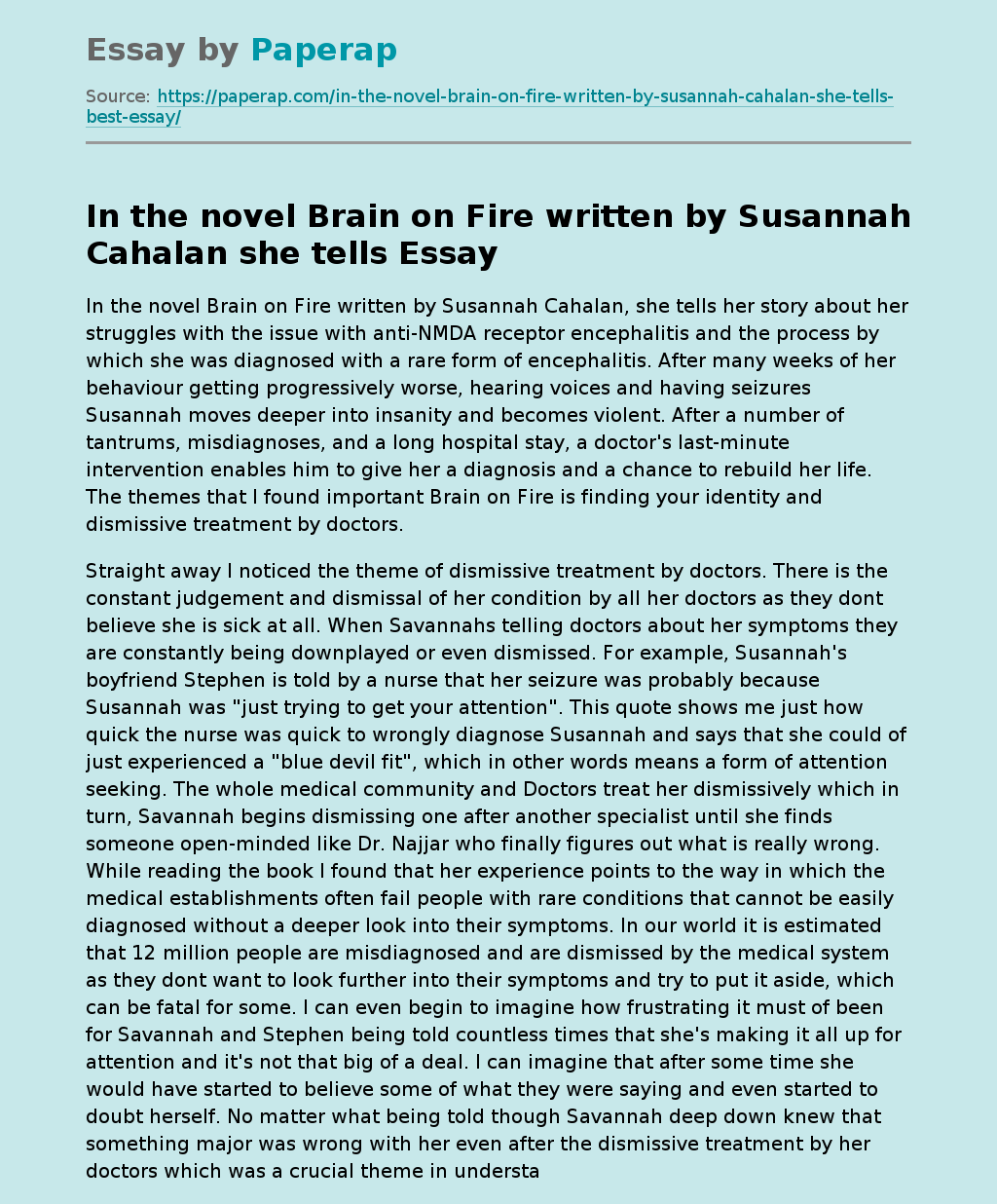In the novel Brain on Fire written by Susannah Cahalan she tells
In the novel Brain on Fire written by Susannah Cahalan, she tells her story about her struggles with the issue with anti-NMDA receptor encephalitis and the process by which she was diagnosed with a rare form of encephalitis. After many weeks of her behaviour getting progressively worse, hearing voices and having seizures Susannah moves deeper into insanity and becomes violent. After a number of tantrums, misdiagnoses, and a long hospital stay, a doctor’s last-minute intervention enables him to give her a diagnosis and a chance to rebuild her life.
The themes that I found important Brain on Fire is finding your identity and dismissive treatment by doctors.
Straight away I noticed the theme of dismissive treatment by doctors. There is the constant judgement and dismissal of her condition by all her doctors as they dont believe she is sick at all. When Savannahs telling doctors about her symptoms they are constantly being downplayed or even dismissed. For example, Susannah’s boyfriend Stephen is told by a nurse that her seizure was probably because Susannah was “just trying to get your attention”.
This quote shows me just how quick the nurse was quick to wrongly diagnose Susannah and says that she could of just experienced a “blue devil fit”, which in other words means a form of attention seeking. The whole medical community and Doctors treat her dismissively which in turn, Savannah begins dismissing one after another specialist until she finds someone open-minded like Dr. Najjar who finally figures out what is really wrong.
While reading the book I found that her experience points to the way in which the medical establishments often fail people with rare conditions that cannot be easily diagnosed without a deeper look into their symptoms. In our world it is estimated that 12 million people are misdiagnosed and are dismissed by the medical system as they dont want to look further into their symptoms and try to put it aside, which can be fatal for some. I can even begin to imagine how frustrating it must of been for Savannah and Stephen being told countless times that she’s making it all up for attention and it’s not that big of a deal. I can imagine that after some time she would have started to believe some of what they were saying and even started to doubt herself. No matter what being told though Savannah deep down knew that something major was wrong with her even after the dismissive treatment by her doctors which was a crucial theme in understanding the novel.
When Savannah wakes up in a hospital with no memory of the events from the previous month, during which she would have violent episodes and delusions the theme of finding her identity again became very clear to me. Suzannah is constantly questioning who she is and whether she’ll ever be the same as she once was. Even during this time when I hardly recognize myself, there are still shadows of the real Susannah, a person who cares what her family and friends think, who doesn’t want to cause them pain.” This quote shows me that when she is recovering, she knows that she is not the same person as she was before the illness and before it had its effects on her. It shows me that she wants to be the old Suzannah for her family and friends but wants to move on and find her true identity after everything that’s happened. It has become very clear to me after Savannah as diagnosed with anti-NMDA receptor encephalitis that your identity isn’t something fixed, static, or a separate thing from the human body. There is the social aspect of identity which is how others see Susannah, based on their memories and judgments of her and then there is the personal aspect, which is closely explored over the course of Susannahs disease.
In the novel Brain on Fire written by Susannah Cahalan she tells. (2019, Dec 20). Retrieved from https://paperap.com/in-the-novel-brain-on-fire-written-by-susannah-cahalan-she-tells-best-essay/

